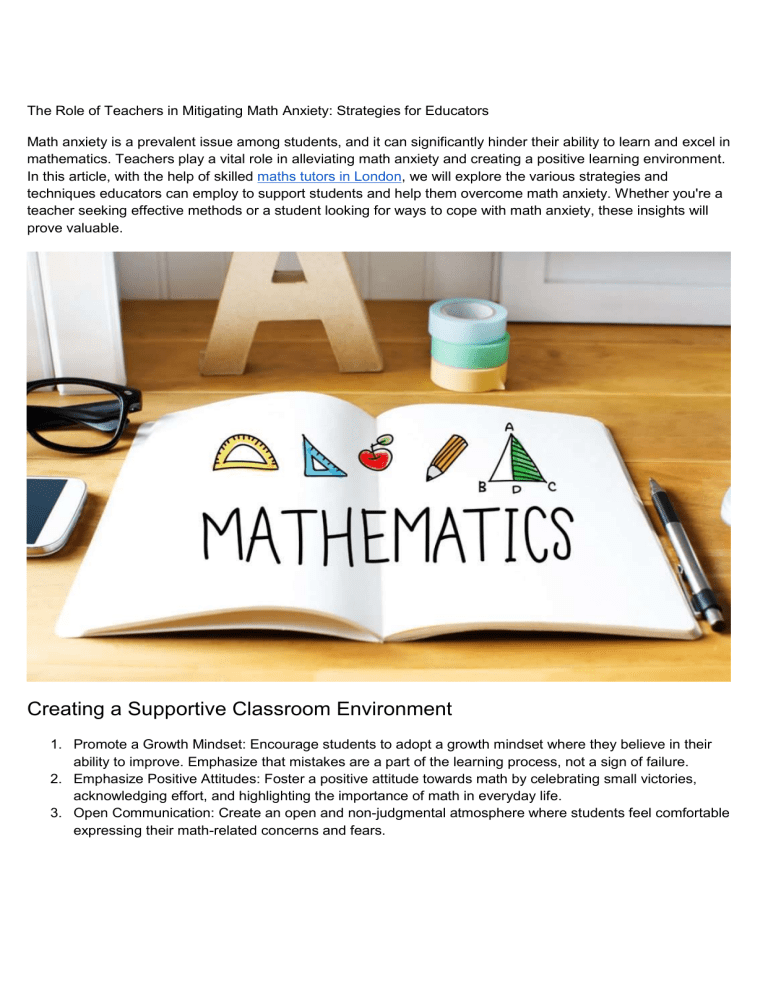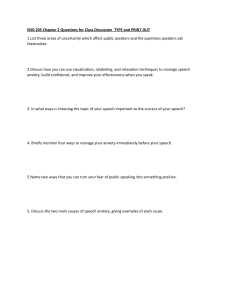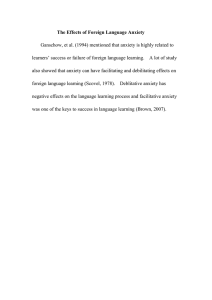The Role of Teachers in Mitigating Math Anxiety Strategies for Educators
advertisement

The Role of Teachers in Mitigating Math Anxiety: Strategies for Educators Math anxiety is a prevalent issue among students, and it can significantly hinder their ability to learn and excel in mathematics. Teachers play a vital role in alleviating math anxiety and creating a positive learning environment. In this article, with the help of skilled maths tutors in London, we will explore the various strategies and techniques educators can employ to support students and help them overcome math anxiety. Whether you're a teacher seeking effective methods or a student looking for ways to cope with math anxiety, these insights will prove valuable. Creating a Supportive Classroom Environment 1. Promote a Growth Mindset: Encourage students to adopt a growth mindset where they believe in their ability to improve. Emphasize that mistakes are a part of the learning process, not a sign of failure. 2. Emphasize Positive Attitudes: Foster a positive attitude towards math by celebrating small victories, acknowledging effort, and highlighting the importance of math in everyday life. 3. Open Communication: Create an open and non-judgmental atmosphere where students feel comfortable expressing their math-related concerns and fears. Tailoring Instruction to Individual Needs Differentiated Instruction: Recognize that students have varying levels of math proficiency. Provide personalized instruction, extra support, or advanced challenges to meet their individual needs. Real-World Relevance: Show students how math is relevant in their daily lives and future careers. Highlight practical applications to motivate their learning. Building Math Confidence Progressive Challenges: Gradually increase the complexity of math problems, starting with easier ones and progressing to more challenging concepts. This helps build confidence and competence. Positive Reinforcement: Recognize and celebrate students' achievements in math. Positive reinforcement boosts their self-esteem and encourages continued effort. Effective Teaching Strategies Clear Explanations: Provide clear, step-by-step explanations of math concepts. Break down complex problems into manageable parts. Visual Aids: Use visual aids like diagrams and graphs to enhance understanding. Visual representations can make abstract math concepts more tangible. Addressing Math Anxiety Directly Acknowledge Anxiety: Validate students' feelings of anxiety. Let them know that it's normal to feel this way and that you're there to support them. Relaxation Techniques: Teach students relaxation techniques such as deep breathing exercises to help them manage anxiety during math assessments. Encouraging Peer Support Peer Tutoring: Encourage students to help each other. Peer tutoring can be a powerful way for students to learn from their peers in a supportive environment. Group Activities: Organize group activities that promote collaborative learning. Working together can reduce anxiety and create a sense of camaraderie among students. Making Math Fun Math Games: Incorporate math games and activities that make learning enjoyable. Gamification can reduce anxiety and create a positive association with math. Real-World Math Challenges: Present students with real-world math challenges or projects that allow them to apply what they've learned in practical situations. In conclusion, teachers have a critical role in mitigating math anxiety and helping students build confidence in their math skills. By creating a supportive environment, tailoring instruction, and employing effective teaching strategies, educators can empower students to overcome math anxiety and excel in mathematics. These strategies not only benefit students in the classroom but also equip them with valuable skills for future success.


